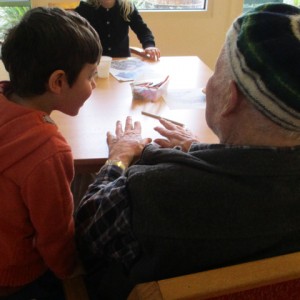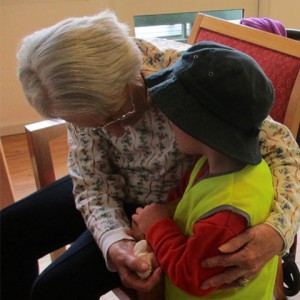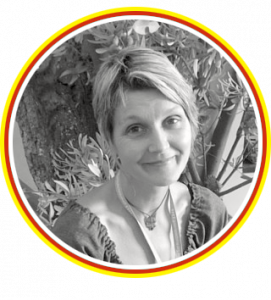Early in March, Jess – Integrated Apple Tree Kindergarten program – and I were lucky enough to be asked to present on behalf of KCCC at the Inclusion Expo.
As a new team member at KCCC, it was a perfect opportunity for me to examine where we sit in terms of inclusion. Firstly, at KCCC we do not simply look at what inclusion means for children with additional needs, though this is an extremely critical aspect of inclusion. We look though a wider lens and we addressed what this meant for all children and families at KCCC in both the long and short term. It was an opportunity to unpack the everyday ways in which children are supported to gain a sense of belonging and ownership of this space. The relationships which are fostered here are an intrinsic part of this process. KCCC’s attention to children’s rights plays a key part in this, as it means we are constantly observing, noticing and responding to what children are telling us through their non-verbal and verbal communication. It involves spending time observing and listening to children and seeking ways to make everyone feel welcome and valued. It also includes the way relationships are fostered and nurtured; relationships are big at KCCC. Our orientation process and efforts to get to know the family, the child’s first teacher, are a valuable step to help us create an inclusive environment. Our ongoing efforts to get to know every child are not only reflected in action, but also in our planning through different pieces of documentation, including the children’s Individual Education Plan’s, which respond to children’s dispositions of learning and the important role of their interactions with others and the world around them.
The role of our educators featured heavily in our presentation, as we shared the different ways in which we are constantly reviewing and critiquing our practice. We were keen to emphasise how ongoing learning and deep reflection prevented us from working without thinking. This supports us to have a level of consciousness that means we are always aware of new potentials and always ready to rethink and be flexible and spontaneous. The individual room meetings and the this years addition of our Educators reflection journals, have helped support this.
We considered how children potentially face exclusion through long or short term illness. We talked about the importance of ensuring children were able to attend the service when they have a medical condition or injury. Jess was able to share how we accommodated the different adaptations we have made to the physical environment to support, as well as the training and learnings staff had to undertake to best support children and families in these circumstances.
“I am so thankful and will never forget how my child was included during his kinder year at KCCC. He was diagnosed with HSP, a condition which meant he could not walk for several months. As parents we thought that having this condition meant he would miss out on a large part of his kinder year. We spoke to his kinder teacher, Morag and she reassured us that he would still be able to come to kinder. They adapted the program to ensure he would be included and be able to participate. The staff team worked with the other children who were also inclusive. Our son is now an active school boy who has not forgotten this either.”
Carla T
The physical environment plays a huge role in this, often simple adjustments and modification transform a space from one with limited access to one which accommodates everyone. Indeed the garden space, indoor/outdoor program and open door policy, mean that children can go in and out with the flow and work with others and in spaces that best suit their needs, interests, skills and knowledge. The garden and the openness of the space provides a myriad of opportunities for children to engage according to their ways of being and doing. The garden space and our strong belief in play, including risky play was a prominent feature in our presentation, as we considered the importance of the power shift occurs through play and how this supports children to feel their work is valued, supported and trusted. As children so often have less power than adults, through privileging their play they are able to shift the power dynamic and take the lead, in play children are in control. Risky play also provides further opportunity for them to test their skills, whilst witnessing that the adults around them trust them. We were pleased to be able to showcase the legendary apple tree, our tool workspace, The Venny and river excursions, and the opportunities that these elements of our program bring. We showcased how we had considered families varied cultural backgrounds and how these are reflected in many of our celebrations and in our everyday programs. We were pleased to show how we had listened to our families and begun to reach out around the globe and create programs, such as our Sister School in Denmark and newly formed relationship with a school in India. It was also a delight to be able to share stories of how our families make such a rich and warm community, which is reflected in how many ways in which they are involved in KCCC.
Jess and I talked a lot about ‘isms’ from racism, to ageism, and the feedback from the audience in regard to our Intergenerational program with Lynch’s Bridge, gave us confidence that KCCC may have steered others into wanting to connect with some of their local residents, particularly those in aged care facilities. Another ‘ism’ we discussed was sexism and we talked of how our journey to create a less gendered space, is still ongoing. We considered how the physical environment goes a long way to promoting gender free play choices, but also how we are looking at our own role, through our language, values and expectations of children. We talked about how we need to continue to explore what we are modelling to children around gender and how we need to work with families to ensure, we are not viewing girls through their appearance and clothing, nor limiting their choices of play, nor are we having stereotype expectations of boys.
It was a privilege to share our journey and to prompt these discussions, as we continue to strive to create a warm, equitable, welcoming and inclusive environment, where everyone feels valued.




